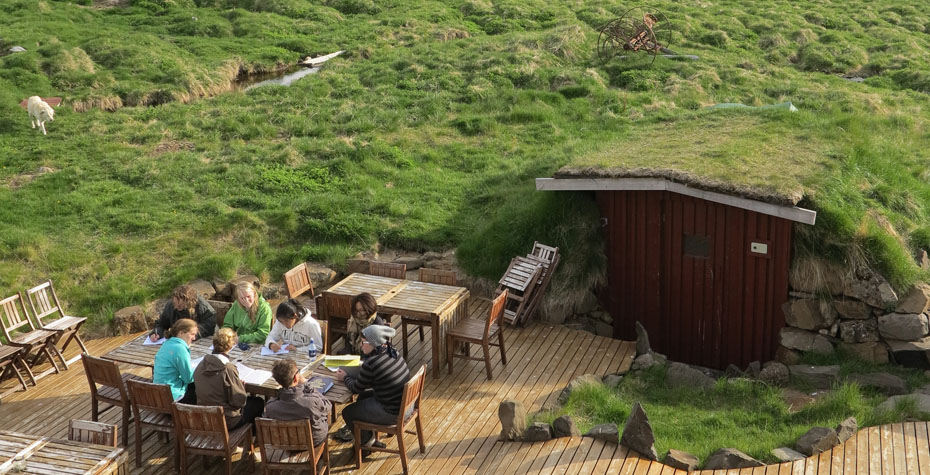Summer Session Anthropology Course in Iceland Offers Intensive Fieldwork Opportunities

Each year after the spring semester finishes in May and Wellesley students disperse into the world, a group of students travel with instructor Justin Armstrong to Iceland to immerse themselves in a two-week intensive summer course, studying cultural anthropology.
ANTH299 takes a unique perspective in examining the field of cultural geography through the lens of anthropology. Together, students look at how the environment shapes culture and culture shapes environment. Armstrong said, "Iceland is the perfect location for this course because the setting is so striking and the connections between people and the landscape are so immediately apparent. It also serves as an introduction to ethnographic fieldwork, a practice that finds application in a number of social science disciplines."
Beyond that, Iceland’s geography is also of global interest, as its glacier activity can be the harbinger of climate trends to come. In January and February NASA’s Jet Propulsion Laboratory (JPL) sent a high-precision radar instrument left to Iceland to create detailed maps of how glaciers move in the dead of winter. The maps will help scientists understand some of the basic processes involved in melting glaciers, major contributors to rising sea levels.
Back on the ground... what's a typical day like in ANTH299? According to Armstrong, the learning begins around 9 a.m., when students meet for a breakfast meeting to debrief, hear a lecture, and discuss the subject of the day. After lunch, students embark on individual projects that may involve interviewing local citizens, taking photographs, making maps, shooting video, researching, or participating in a relevant cultural activity. In the evening, the whole group goes hiking or embarks on another adventure.
"For me, cultural anthropology is equal parts theory and practice, and that practice comes from direct engagement with the people, places, and things that we study," said Armstrong. "For that reason I feel that it is key to a student's understanding of the discipline to have the opportunity to experience hands-on fieldwork in a new environment. Working in Iceland gives the students a chance to put the concepts they've learned in the classroom to work. In this way, I often think of our trip to Iceland as a kind of ethnographic laboratory where students can put their ideas to the test. And where else can you have a lecture in a cafe, swim in a geothermic pool, see reindeer, and explore a remote fishing village under the midnight sun all in the same day?"
And who knows where it may lead? A student from the 2012 trip was awarded an artist residency (NES) and returned to Iceland in January 2013 to complete an epic poem on Iceland that became her senior thesis. She's now a graduate student in creative writing at the University of Wisconsin-Madison. And as Armstrong explained, “We have also formed a continuing relationship with a cultural and biological field station in Iceland where we will collaborate on multiyear projects to document and analyze the cultural geography of rural Iceland.”
Katie Donlan ’16 took ANTH299 in the summer of 2013, and the course cemented her desire to become an anthropology major. Throughout the two weeks, she found herself intrigued and surprised by the people she met and places she visit. “One aspect of the trip that surprised the whole group was how our perceptions of Reykjavik (the capital and largest city in Iceland) changed from when we first arrived, to when we returned after seeing the rest of Iceland,” she said. “I'm glad our trip was planned this way - allowing us come full circle. At the start of our trip when we all arrived in Reykjavik, the group's sense was that Reykjavik was a fairly small city, relatively quiet compared to some of the U.S. cities we were used to. However, after traveling to the most remote places we had ever been (some towns had only a few hundred people), we all felt claustrophobic coming back to Reykjavik, which now seemed like a huge metropolis. I think this was important especially in the context of the class - it challenged the way we thought about space and place.”
Interested? There's still time to register for the 2014 course. Students with financial aid may apply for loans for course expenses before the last day of spring semester classes.
Home and Away is covered in Spotlight on Teaching, an ongoing web series highlighting innovative approaches, cool concepts, and exceptional teaching at Wellesley.
